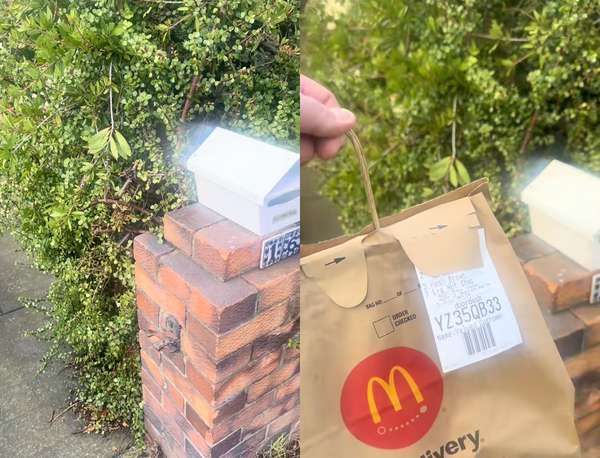

A Melbourne DoorDash driver's TikTok video about delivering McDonald's just 80 metres from the restaurant has sparked conversations across the country — but the story might not be as unusual as you'd think.
In a video shared online, the driver said the drop-off point was just 80m from the restaurant, a trip he jokingly described in the caption as an 'egregious misuse of the DoorDash product'. Despite the pitiful distance, the job still paid $10.26.
The clip quickly went viral, drawing a flurry of reactions. Many current and former delivery workers admitted they'd experienced similar situations, while customers chimed in with their own reasons for ultra-short orders.
'You never know what the person is going through. I lost a baby to SIDS. I can't even walk out to check my mail. Seeing babies in my non-safe places, I cry like a crazy lady.'
Who's really using food delivery services?
While food delivery apps dominate social media feeds, older Australians are actually the least likely to use them. Research shows the use of meal delivery services drops off sharply in generations aged over 60, with under one-in-six seniors (15.9%) and only 12.3% of almost-seniors using these services.
This makes the Melbourne McDonald's delivery story particularly interesting. When someone over 60 does order food delivery, there’s often a compelling reason behind it.
The real reasons behind ultra-short deliveries
The responses to the viral video revealed dozens of legitimate reasons why someone might order food from practically next door:
Mobility and health challenges: 'They might have a disability and not be able to make that distance. They might be incredibly hungover or sick,' one commenter noted.
New parents: 'Probably a mum with a baby asleep. Can't just leave them unfortunately.'
Recovery from surgery or illness: 'Healing from an operation' was a common theme.
Pure convenience: 'Sometimes you just don't want to leave the house,' one person admitted. Another added, 'I mean… we've all done it.'
Support services available for Australians who need meal assistance
Meals on Wheels: Subsidised meal delivery for seniors and people with disabilities
NDIS meal services: Funded meal delivery for eligible participants
Commonwealth Home Support Programme: Entry-level supports for seniors 65+ (50+ for Indigenous Australians)
Local community food programs and volunteer services
Understanding the true cost
The $10.26 this driver earned might seem expensive for an 80-metre trip, but it reflects the reality of delivery economics. Australians spend an average of $60 on food delivery services per week, which equals $240 per month, or $3,120 per year.
However, seniors spend the least on groceries at $170 per week, suggesting that working adults and/or people with children at home typically have the highest costs. For seniors on fixed incomes, each delivery decision carries more weight.
Source: @bigwheels87 / Tiktok.
What 80 metres actually means
To put this distance in perspective, in Japan, the standard measure for walking distance is 80 metres for 1 minute of walking time. For someone with mobility challenges, even this one-minute walk can be insurmountable. Research on Melbourne walking patterns shows the median walk to a bus stop is 390 metres and to a tram stop is 360 metres — both considerably longer than this McDonald's delivery.
The accessibility angle often overlooked
Australia has registered NDIS and Home Care Package meal providers offering funded meal delivery services, with over 140 meal options delivered to participants' homes. These services exist precisely because many Australians need support accessing food, whether due to disability, age, or circumstance.
Legitimate reasons for short-distance food delivery
Mobility impairments or disability
Caring for young children or dependents
Illness or post-surgical recovery
Mental health challenges
Severe weather conditions
Safety concerns in the neighbourhood
Simply having a challenging day
The driver's perspective
Interestingly, the driver who started this conversation wasn't complaining. In fact, he said: 'I wish every delivery was like this.' Short-distance deliveries are actually preferable for many drivers — quicker completion times, less fuel consumption, and the ability to fit more deliveries into their shift.
In 2024, the average DoorDasher earned $12.23 per hour, with drivers earning approximately $0.92 per mile based on total distance driven while on deliveries. An 80-metre delivery that pays over $10 is actually quite lucrative from a time and distance perspective.
For context, DoorDash’s 2023 End of Year Trend Report revealed the shortest delivery completed by one of its drivers that year was just 100 metres — making this Melbourne McDonald's run a contender for a new personal record.
A changing conversation about convenience
The overwhelmingly supportive responses to this story suggest Australians are becoming more understanding about different circumstances and needs. Comments ranged from practical ('They could be working from home, have a sick child, be babysitting') to deeply personal experiences shared by people explaining their own situations.
Consumer research shows convenience remains one of the most common themes in food ordering preferences, with people loving that they don't have to leave the house, or even the couch — which is where around half of consumers eat their takeaway.
Looking beyond the surface
What started as a potentially viral 'lazy customer' story instead became a masterclass in empathy. The responses revealed a community that understands not everyone's circumstances are the same, and that sometimes what looks like an unnecessary convenience is actually essential support.
For the driver who shared his story, DoorDash's 2024 trend report showed various surprising moments that had consumers ordering, from weather emergencies to forgotten celebrations. His 80-metre McDonald's run might have seemed unusual, but it fits into a broader pattern of people using delivery services for circumstances others might not immediately understand.
The real story here isn't about laziness or waste — it's about a service working exactly as it should, connecting people with what they need when they need it, regardless of distance. And sometimes, 80 metres might as well be 80 kilometres when you're dealing with life's challenges.
[1] Aussie DoorDash driver goes viral after bizarre request - as hundreds reveal they're guilty of the same thing - Daily Mail - https://www.dailymail.co.uk/news/ar...tml?ns_mchannel=rss&ns_campaign=1490&ito=1490
[2] Meal delivery services now used by over 7 million Australians after strong growth during the pandemic - Roy Morgan Research - https://www.roymorgan.com/findings/...lians-after-strong-growth-during-the-pandemic
[3] NSW Meals on Wheels - How It Works - https://nswmealsonwheels.org.au/our-impact/how-it-works
[4] Average grocery bill and cost of food in Australia - Budget Direct - https://www.budgetdirect.com.au/hom...research/average-grocery-bill-statistics.html
[5] The average cost of groceries per month - https://www.finder.com.au/budgeting/average-grocery-bill
[6] The average cost of groceries per month - https://www.finder.com.au/budgeting/average-grocery-bill
[7] Australia Travel Cost - Average Price of a Vacation to Australia: Food & Meal Budget, Daily & Weekly Expenses | Budget Your Trip - https://www.budgetyourtrip.com/australia
[8] The contribution of area-level walkability to geographic variation in physical activity - https://pophealthmetrics.biomedcentral.com/articles/10.1186/s12963-017-0149-x
[9] How Far Will DoorDash Deliver? - Playbite - https://www.playbite.com/how-far-will-doordash-deliver/
[10] How Far Will DoorDash Deliver? - Playbite - https://www.playbite.com/how-far-will-doordash-deliver/
[11] TikTok Food Trends: Stats and Trends Shaping 2025 - https://pos.toasttab.com/blog/on-the-line/tiktok-food-trends
[12] Meal delivery services now used by over 7 million Australians - Roy Morgan Research - https://www.roymorgan.com/findings/...lians-after-strong-growth-during-the-pandemic
[13] NSW Meals on Wheels - How It Works - https://nswmealsonwheels.org.au/our-impact/how-it-works
[1] DoorDash End of Year Trend Report 2023 - DoorDash Australia - https://about.doordash.com/en-au/news/2023-end-of-year-report







